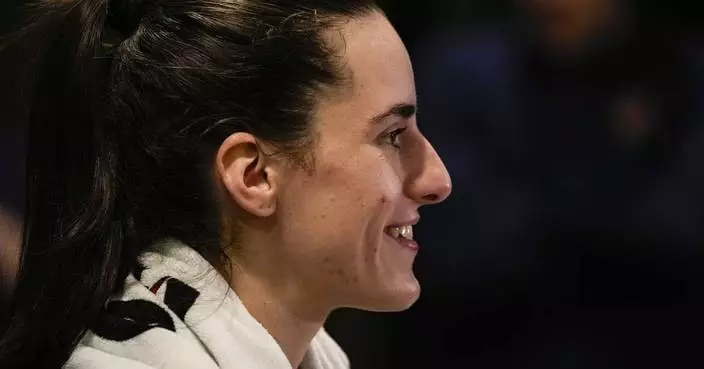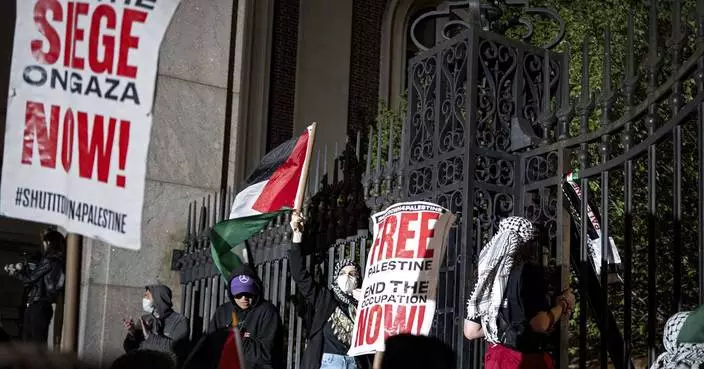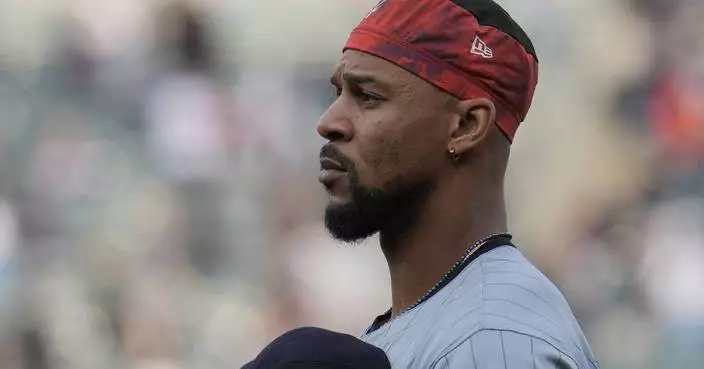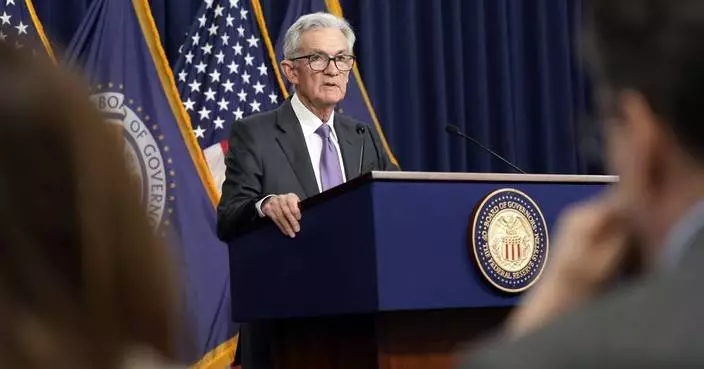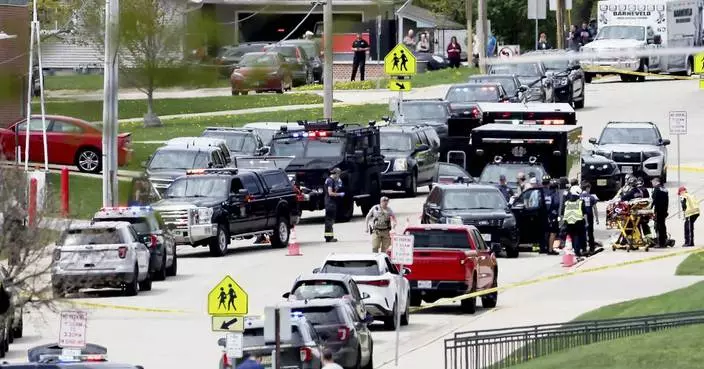AUGUSTA, Ga. (AP) — Tom Watson only saw unity, conversation and easy laughter among 33 champions at the Masters Club dinner, seven of them now with Saudi-funded LIV Golf. Watson longs for the day golf can feel that way all year long.
Unity is a popular topic at the first major of the year because the PGA Tour has suspended LIV players for defecting to the rival circuit. The only time all the world's best get together are at the majors, and the Masters is the first chance for that since July.
Watson said he asked Masters Chairman Fred Ridley if he could speak toward the end of the Champions Dinner on Tuesday night.
“I'm looking around the room and I'm seeing just a wonderful experience everybody is having,” Watson, a two-time Masters champion, said Thursday. “They are jovial. They are having a great time. They are laughing. And I said, ‘Ain’t it good to be together again?'”
Watson said the room grew quiet and then it was time to leave.
“And in a sense, I hope that the players themselves took that to say, ‘You know, we have to do something,’” Watson said. He paused before repeating, "We have to do something.”
Watson, three-time champion Gary Player and six-time champion Jack Nicklaus were together again on the first tee Thursday morning to hit the honorary tee shot, which was delayed by overnight rain.
They have combined to win 35 majors — Nicklaus and Player own the career Grand Slam — and are major figures in golf who are among those saddened by the split in in the game as a result of the arrival of LIV Golf. The circuit lured away major champions with guaranteed Saudi riches.
But the Masters Club is a time for celebration. It was said to be like that a year ago with no difference this time around. Most of stories were about Seve Ballesteros because the defending Masters champion is also a Spaniard, Jon Rahm.
There is no indication the two tours are about to come together, even as t he PGA Tour negotiates with the Public Investment Fund of Saudi Arabia — the money behind LIV — as a minority investor in the new commercial enterprise.
Among the obstacles for unification is a path back to the PGA Tour for LIV players, assuming they all want to return.
“The best outcome is the best players play against each other all the time,” said Nicklaus, who has a stake in golf with his Memorial Tournament.
He said he has spoken with PGA Tour Commissioner Jay Monahan and was told the tour was doing fine.
“If Jay thinks we’re doing fine, we’ll get there. I think we’ll get there,” Nicklaus said. “And I certainly hope that happens, the sooner the better.”
Player believes any solution has to include paying players who stayed loyal to the tour.
“You've got to get together and come to a solution. If you cannot — it's not good,” he said. “The public don't like it, and we as professionals don't like it, either.”
Listening to the news conference from the front row was former PGA Tour Commissioner Tim Finchem, now an Augusta National member. He retired before the Saudis got involved in golf and has stayed relatively quiet, not willing to offer an opinion.
Finchem was in his first year as commissioner in 1994 when he quickly shot down Greg Norman's effort to start a world tour. He said in 2010 he could foresee a world tour in the future without knowing what shape it could take.
Rory McIlroy has been among those suggesting a series of tournaments around the world for the top players, and that perhaps any solution with LIV could include that.
Finchem isn't so sure the fractured landscape will yield any form of a world tour.
“Golf is not much different than it was 10 years ago and it won't be much different 10 years from now,” Finchem said. “They shouldn't muck around with it.”
About the only thing everyone can agree on is that having players scattered among different tours and only competing against other four times a year isn't helping the sport.
“We all know it’s a difficult situation for professional golf right now,” Watson said. "The players really kind of have control, I think, in a sense. What do they want to do? We’ll see where it goes. We don’t have the information or the answers. I don’t think the PGA Tour or the LIV tour really have an answer right now.
“But I think in this room, I know the three of us want to get together,” he said. “We want to get together like we were at that (Masters) Champions Dinner — happy, the best players playing against each other. That’s what we want in professional golf. And right now, we don’t have it.”
AP golf: https://apnews.com/hub/golf
PORT-AU-PRINCE, Haiti (AP) — A surprise announcement that revealed Haiti’s new prime minister is threatening to fracture a recently installed transitional council tasked with choosing new leaders for the gang-riddled Caribbean country.
Four of seven council members with voting powers said Tuesday that they had chosen Fritz Bélizaire as prime minister, taking many Haitians aback with their declaration and unexpected political alliance.
The council members who oppose Bélizaire, who served as Haiti’s sports minister during the second presidency of René Préval from 2006 to 2011, are now weighing options including fighting the decision or resigning from the council.
A person with direct knowledge of the situation who did not want to be identified because negotiations are ongoing said the council’s political accord had been violated by the unexpected move and that some council members are considering other choices as potential prime minister.
The council on Tuesday was scheduled to hold an election and choose its president. But two hours and a profuse apology later, one council member said that not only a council president had been chosen, but a prime minister as well. Murmurs rippled through the room.
The Montana Accord, a civil society group represented by a council member with voting powers, denounced in a statement late Tuesday what it called a “complot” hatched by four council members against the Haitian people “in the middle of the night.”
“The political and economic mafia forces have decided to take control of the presidential council and the government so that they can continue to control the state,” the Montana Accord said.
Haitian politics have long been characterized by secretive dealings, but many worry the country cannot afford further political instability as gangs lay siege to the capital of Port-au-Prince and beyond.
“People change parties (like) they’re changing their shirts,” said François Pierre-Louis, a professor of political science at Queens College in New York and former Haitian politician.
He spoke during an online webinar on Tuesday evening.
Like others, he said he believed that Jean-Charles Moïse, a powerful politician who was a former senator and presidential candidate, was behind Bélizaire’s nomination.
“Interestingly, Moïse, of all the politicians there, is the one calling the shots,” Pierre-Louis said.
Moïse, however, does not sit on the council. His party, Pitit Desalin, is represented by Emmanuel Vertilaire, who is among the four council members who support Bélizaire.
The others are Louis Gérald Gilles, Smith Augustin and Edgard Leblanc Fils, the council’s new president.
They could not be immediately reached for comment.
A document shared with The Associated Press and signed by the four council members who chose the new prime minister state they have agreed to make decisions by consensus. The document is titled, “Constitution of an Indissoluble Majority Bloc within the Presidential Council.”
The move prompted the Fanmi Lavalas party to issue a statement Wednesday calling it a “masquerade” and “conspiracy” to guarantee that PHTK “thugs and their allies retain power…and continue the tradition of corruption.”
“The Lavalas Family strongly rejects the betrayal scandal that occurred on April 30,” the party said.
Fils represents the January 30 political group, which is made up of parties including PHTK, whose members include former President Michel Martelly and slain President Jovenel Moïse. Meanwhile, Augustin represents the EDE/RED political party, founded by former Prime Minister Claude Joseph, and Gilles represents the Dec. 21 agreement, which is associated with f ormer Prime Minister Ariel Henry, who recently resigned.
Henry was on an official visit to Kenya to push for the U.N.-backed deployment of a police force from the East African country when gangs in Haiti launched coordinated attacks starting Feb. 29.
They have burned police stations, opened fire on the main international airport that remains closed since early March and stormed Haiti’s two biggest prisons, releasing more than 4,000 inmates. The violence continues unabated in certain part of Port-au-Prince, including the area around the National Palace.
Haitians are demanding that security be a top priority for the council, which is tasked with selecting a new prime minister and Cabinet, as well as prepare for eventual general elections.
But some Haitians are wary of the council and the decisions it’s taking.
Jean Selcé, a 57-year-old electrician, noted that most of the council members are longtime politicians: “Their past is not really positive.”
“I hope their mentality can change, but I don’t believe it will,” he said. “They don’t really love the country. Who’s dying right now? It’s Haitians like me.”
Robert Fatton, a Haitian politics expert at the University of Virginia, noted that some of the parties represented on the council are responsible for the current chaos in Haiti.
“It’s a contradiction,” he said. “Every time we seem to be in a crisis, we reappoint the same people and hope that they change their ways, but they do not.”
Raising the same criticism is Michael Deibert, author of “Notes From the Last Testament: The Struggle for Haiti,” and “Haiti Will Not Perish: A Recent History.”
He noted in a recent essay that the council is “dominated by the same political currents who have spent the last 25 years driving Haiti over a cliff, taking advantage of impoverished young men in the slums to be used as political bludgeons before - bloated on the proceeds from kidnapping, extortion, drug trafficking and other criminal enterprises - these groups outgrew the necessity of their patrons.”
More than 2,500 people have been killed or injured across Haiti from January to March, according to the U.N.
In addition, more than 90,000 people have fled Port-au-Prince in just one month given the relentless gang violence.

Street vendors move their booth after gunshots broke out near the National Palace in Port-au-Prince, Haiti, Tuesday, April 30, 2024. (AP Photo/Ramon Espinosa)
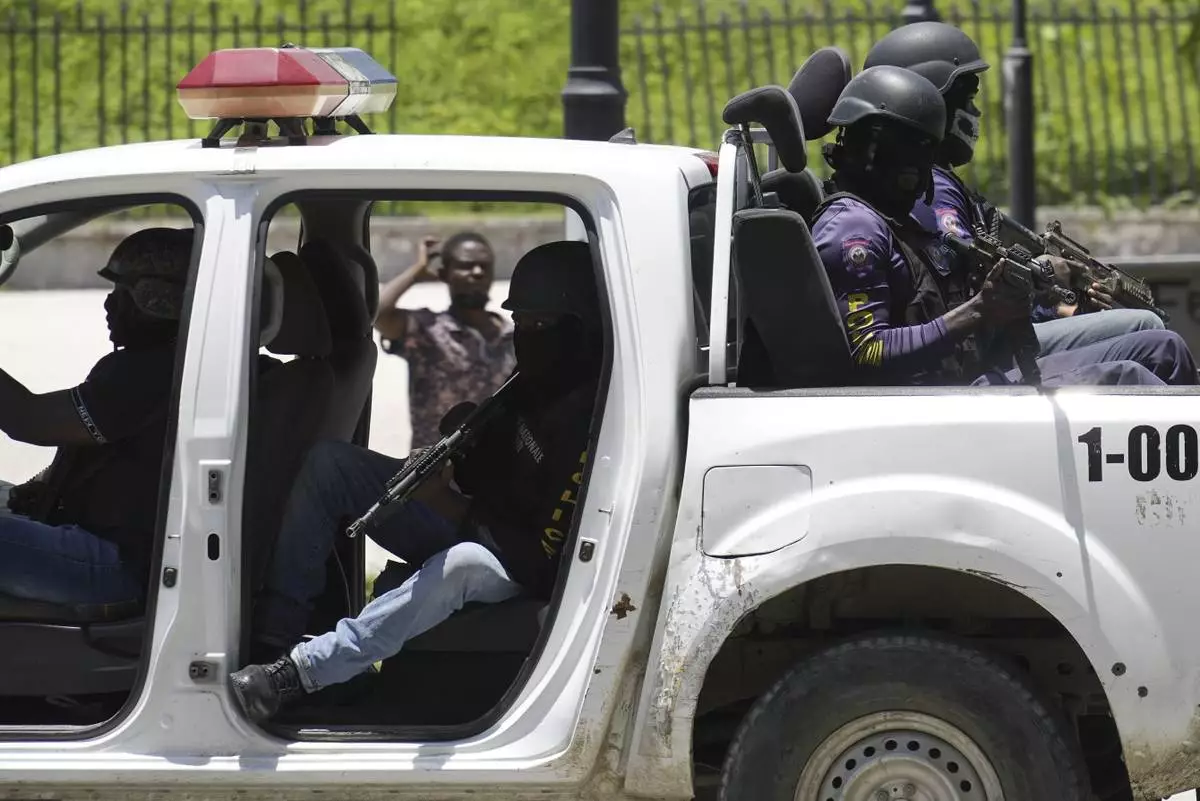
Police patrol near the National Palace amid the sound of gunshots in the distance in Port-au-Prince, Haiti, Tuesday, April 30, 2024. (AP Photo/Ramon Espinosa)

CORRECTS DAY - People run for cover as shots ring out near the National Palace in Port-au-Prince, Haiti, Tuesday, April 30, 2024. (AP Photo/Ramon Espinosa)

Edgard Leblanc Fils speaks after the transitional council named him president of the council in Port-au-Prince, Haiti, Tuesday, April 30, 2024. The transitional council will act as the country’s presidency until it can arrange presidential elections sometime before it disbands, which must be by February 2026. (AP Photo/Odelyn Joseph)
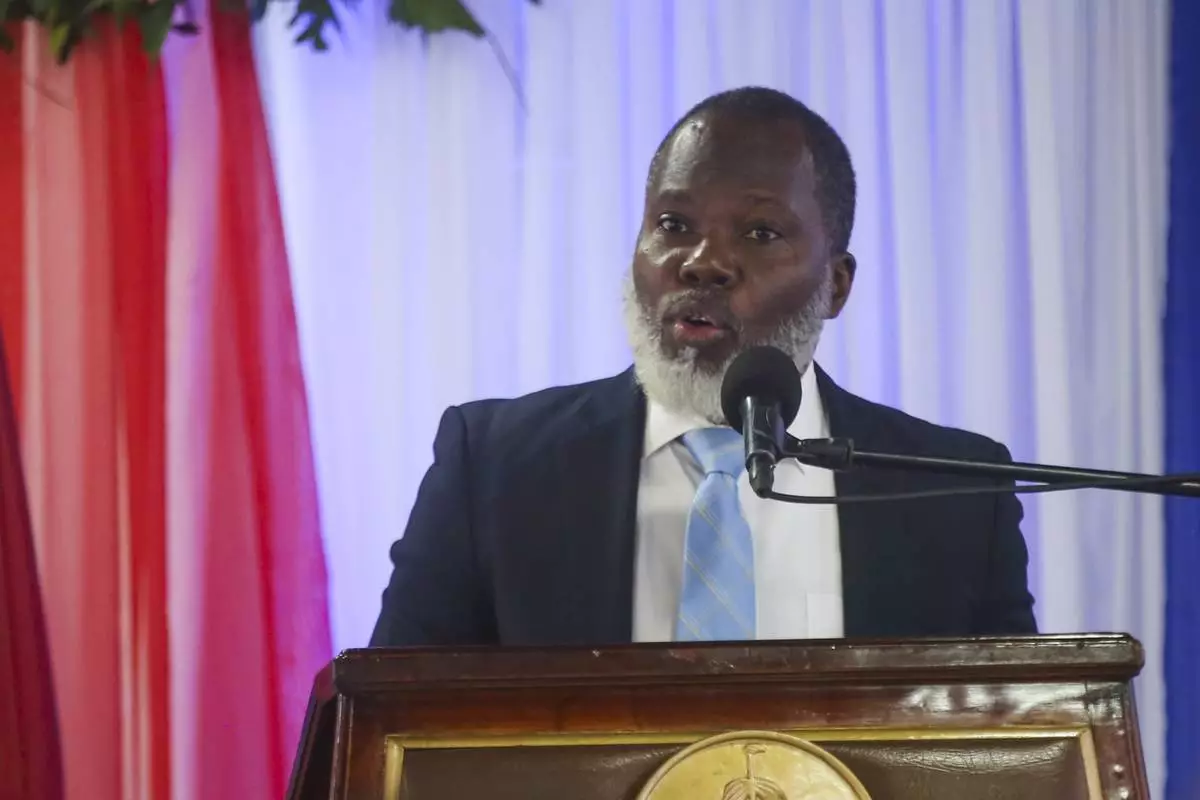
Transitional council member Frisnel Joseph speaks during a ceremony to name its president and a prime minister in Port-au-Prince, Haiti, Tuesday, April 30, 2024. The transitional council will act as the country’s presidency until it can arrange presidential elections sometime before it disbands, which must be by February 2026. (AP Photo/Odelyn Joseph)

IDENTIFIES TRANSITIONAL COUNCIL MEMBERS - Transitional Council members, from left to right; Fritz Alphonse Jean, Laurent Saint-Cyr, Frinel Joseph, Edgard Leblanc Fils, Regine Abraham, Emmanuel Vertilaire, Smith Augustin, Leslie Voltaire and Louis Gerald Gilles, pose for a group photo after a ceremony to name its president and a prime minister in Port-au-Prince, Haiti, Tuesday, April 30, 2024. Fils was chosen as the president of the panel. (AP Photo/Odelyn Joseph)

Edgard Leblanc Fils, left, and Smith Augustin prepare to pose for a group photo with the transitional council after it named Fils as its president in Port-au-Prince, Haiti, Tuesday, April 30, 2024. The transitional council will act as the country’s presidency until it can arrange presidential elections sometime before it disbands, which must be by February 2026. (AP Photo/Odelyn Joseph)










